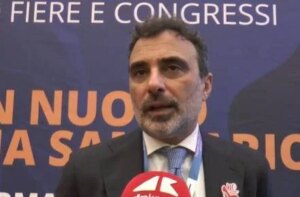
Fewer and fewer people of working age are financing the pensions of a growing number of older people. No one can deny the demographic change and the resulting aging of society in Germany. Pressure on the pension system is increasing and has engaged the European country in a heated debate over the best way to ensure that pensions are sustainable over time and do not lead to a future of poverty in old age. Members of the governing coalition, made up of conservatives and social democrats, will meet this Thursday to seek a solution to the stalled conflict over the government’s pension plans. This despite the fact that in mid-November it was said that the bill approved by the government in August would not be further modified.
The pension bill was originally supposed to pass the German parliament next week, but opposition from young conservatives to voting in favor has caused an internal crisis and it has not yet been put on the agenda. Their vote is needed to implement the reform, as Friedrich Merz’s government only has a majority of 12 votes. The Social Democratic Party (SPD) wants approval by the end of the year and does not want to give in on a point that was one of its electoral promises. However, everything is now at a standstill and it is unclear when a compromise will be reached.
The so-called Youth Group of the Union parliamentary group – formed by the Christian Democratic Union (CDU) and the Christian Social Union (CSU) -, which has 18 deputies, accepts that the level of pensions (which is used to calculate pensions) be set by law at 48% of the country’s average salary until 2031. But it refuses to accept that after that date it will be done on that basis and asks that it be on the basis that it would be if there were not set by the law, i.e. lower by one percentage point. They criticize that, if not adopted, this measure would lead to an additional cost of up to 120 billion euros in tax funds until 2040. The Chancellor sees it differently: “If the car stops somewhere and then starts driving again, it will continue from the point where it stopped, and not from the point where it would be if it had not stopped,” Friedrich Merz told German public broadcaster ARD.
In reality, the level of pensions says little about the calculation of the individual amount of benefits for each pensioner, despite what many mistakenly think. This is an average value that shows the relationship between a fictitious average pension after 45 years of contributions and the average salary of the population, calculated every year by the Federal Statistics Office. This pension model in 2024 amounted to 1,770 euros gross per month, but the average benefit that German pensioners received in 2023 was 1,100 euros, according to data from the German Pension Institute (DRV). Although it must also be taken into account that, according to German government data, almost 20% of pensioners in 2024 received more than one pension.
The importance of the pension level is that, from there, the Government uses that figure to adapt its complex formula by which it calculates payments and the real minimum limit. If it is not set at 48%, this value is expected to decrease in the coming years, which would mean a growing impoverishment of pensioners.
However, as economists warn, politicians must take into account demographic evolution: generations with the highest birth rate will soon retire, which will have to be financed by generations with the lowest birth rate. In 15 years the number of pensioners will increase from around 20 to 25 million.
Today, people aged 65 and over represent a growing percentage of the total population. This percentage has increased from 15% in 1991 to 23% in 2024. Added to this is an increase in life expectancy, so pensioners receive their pensions for longer. In this context, for the next federal budget in 2026, the economic institute Ifo has calculated that one third of all estimated tax revenues will go to pension insurance; that is, 127.8 billion euros. Meanwhile, the German Institute of Economics (IW) noted in a study released this week that the country leads in social security spending and has overtaken Denmark, Sweden, Norway, Finland and Iceland.
In any case, without the new law, the pension level is not expected to fall below 48% until 2029, but the government does not want to wait until then. The package, which was supposed to come into force on January 1, also provides for an extension of the maternity pension; the early pension according to which children from the age of six will receive ten euros a month from the State for the deposit of the old-age pension; the active pension with additional tax-free income of up to 2,000 euros per month for pensioners who continue to work and a strengthening of company pensions.
One option that enjoys increasingly strong support is to withdraw the pension package completely, wait for the results of the planned pension commission and present a new project that takes into account the necessary reforms recognized by all government partners. Last Sunday 22 well-known economists and scientists spoke in favor of this path. “Instead of making hasty decisions on pension policy, we should dedicate the necessary time to this issue”, they launched the appeal. They criticize above all the setting of the pension level at 48% and the planned extension of the maternity pension, the two most expensive parts of the pension package which, unlike the active pension, will not serve to increase productivity, but which have a strong political impact.
These criticisms from prestigious economists further strengthened the position of the young conservatives. “It is noteworthy that so many economists are speaking so critically about the pension package,” Young Union group president Pascal Reddig told the newspaper. Handelsblatt. And now the CDU Economic Council is also calling for corrections, saying that the current package “is not adequate to adequately address the demographic and budgetary challenges”. In his opinion, the government “should make a virtue of the necessity of the current conflict and propose the complete package”.





